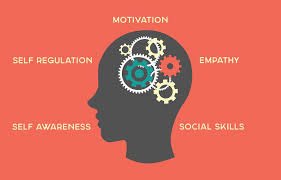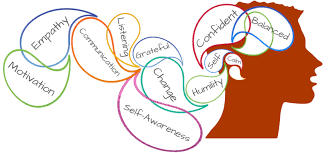
What is Emotional Intelligence (EQ)?
The term emotional intelligence was created by two researchers Peter Salovey and John Mayer in their article “Emotional Intelligence” in the journal Imagination, Cognition, and Personality in 1990. It was later popularized by Daniel Goleman in his 1995 book Emotional Intelligence.
Emotional intelligence (EQ) refers to the ability to recognize, understand, manage, and effectively use one’s own emotions, as well as those of others. It encompasses a range of skills, including self-awareness, self-regulation, empathy, motivation, and social skills. In the context of leadership, EQ plays a pivotal role in building meaningful relationships, resolving conflicts, and driving organizational success.
Take a look at this video to better understand EQ: EQ as a Leader
Let’s look at the components of EQ
Self-Awareness: At the core of emotional intelligence lies self-awareness—the ability to recognize and understand one’s own emotions. Leaders with high self-awareness are better equipped to manage stress, make sound decisions, and remain focused on their goals. They can accurately assess their strengths and weaknesses, fostering a sense of authenticity that resonates with their team.
Self-Regulation: While self-awareness sets the foundation, self-regulation enables leaders to control and channel their emotions effectively. This involves managing impulses, staying calm under pressure, and adapting to changing circumstances. Leaders who practice self-regulation create a positive work environment and inspire confidence in their team members.
Empathy: Empathy is the ability to understand and share the feelings of others. Leaders who demonstrate empathy build stronger connections with their team, fostering a sense of trust and collaboration. By actively listening and showing genuine concern for the well-being of their employees, empathetic leaders create a workplace culture that values individuals.
Motivation: Motivated leaders inspire their teams to achieve greater heights. Motivation in the context of emotional intelligence goes beyond personal drive—it involves a passion for the work, a clear vision, and the ability to motivate others. Leaders who can instill a sense of purpose and enthusiasm in their team members create a positive and high-performing work environment.
Social Skills: Effective communication, conflict resolution, and collaboration are integral components of social skills. Leaders with strong social skills can navigate complex interpersonal dynamics, build rapport, and create a cohesive team. These skills are crucial for fostering a positive organizational culture and achieving collective goals.

Benefits of Emotional Intelligence in Leadership:
Improved Communication: Leaders with high emotional intelligence excel in communication. They can articulate their thoughts clearly, listen actively to others, and adapt their communication style to suit the needs of their team members. This results in a more transparent and open communication flow within the organization.
Enhanced Decision-Making: Emotional intelligence contributes to better decision-making by allowing leaders to consider both rational and emotional factors. Leaders who can weigh the emotional impact of decisions make more informed choices, leading to positive outcomes and increased team confidence.
Effective Conflict Resolution: Conflicts are inevitable in any workplace, but leaders with strong emotional intelligence can navigate these challenges effectively. They approach conflicts with empathy, seek common ground, and find solutions that benefit everyone involved. This contributes to a harmonious work environment.
Increased Employee Engagement: Leaders who prioritize emotional intelligence create a workplace where employees feel valued and understood. This, in turn, leads to higher levels of employee engagement, job satisfaction, and retention. When employees feel that their emotional well-being is acknowledged, they are more likely to invest in their work and contribute positively to the organization.

Practical Strategies for Developing Emotional Intelligence:
It’s critical to understand the difference between IQ and EQ when it comes to developing skills. As an adult we are able to learn skills and possibly enhance our IQ levels, however not substantially. Research suggests that IQ truly does have growth limits whereas EQ has limitless opportunities for growth. EQ growth doesn’t naturally occur, there are strategies to improve and enhance your EQ.
Self-Reflection: Encourage leaders to engage in regular self-reflection to enhance their self-awareness. This can involve journaling, seeking feedback from peers, or working with a mentor or coach who can provide insights into their emotional strengths and areas for improvement.
Active Listening Training: Develop training programs focused on active listening skills. Leaders who actively listen to their team members demonstrate empathy and create an environment where individuals feel heard and understood.
Conflict Resolution Workshops: Provide workshops on effective conflict resolution techniques. These sessions can equip leaders with the skills to navigate conflicts, address underlying issues, and foster a culture of collaboration.
Empathy Building Exercises: Incorporate empathy-building exercises into leadership development programs. These exercises can include role-playing scenarios, case studies, and real-world examples that challenge leaders to consider different perspectives.
Regular Feedback Loops: Establish regular feedback loops within the organization. Constructive feedback helps leaders understand the impact of their actions on others and provides opportunities for continuous improvement.
In Conclusion:
In the ever-evolving landscape of leadership, emotional intelligence stands out as a crucial factor that shapes the success of individuals and organizations alike. Leaders who prioritize and cultivate emotional intelligence create workplaces where individuals thrive, conflicts are resolved constructively, and teams achieve collective success. By understanding and harnessing the power of emotions, leaders can build stronger, more resilient teams that contribute to the long-term success of their organizations.
Do you want to improve your EQ? Set up a coaching call with me today @ 440-212-4987!
